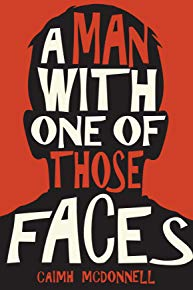Interview with Caimh McDonnell
Author of A Man With One of Those Faces
Caimh McDonnell is a former stand-up comedian and TV comedy writer. His writing includes work for The Sarah Millican Television Programme, A League of Their Own, Mock the Week and Have I Got News for You (what do you mean, you didn’t know they used writers?) He has also written a series of very funny novels, including A Man With One Of Those Faces which was nominated for Best Novel at the 2017 CAP awards and I Have Sinned which was nominated for the Kindle Storyteller Award 2019. He is most well-known for The Dublin Trilogy and the follow-up series, McGarry Stateside.
Buy this book
Caimh, forgive the cliché but we have to start with a pronunciation lesson, or readers are going to be anxious throughout the interview. How should we pronounce Caimh? (The pronunciation of Irish names strikes fear into non-Irish English-speakers the world over. Is that why you do it?)
- No problem. It is pronounced phonetically as Qweeve, which is yes, frankly ridiculous. The weird thing is that when I explain that to people, many of them will write back to me with e-mails starting ‘Dear Qweeve’ – which makes me think that a lot of people don’t understand what phonetically means!
And yes, I use it entirely to scare the English. The fact that it is also my name is entirely a bonus.
You’re our first former stand-up performer and writer. Could you talk a little about the discipline of writing for stand-up and panel shows compared with a novel? They seem like different worlds . . .
- Stand-up and particularly panel shows are all about quick hits. You’ve got essentially a couple of sentences to hit a gag and so brevity is everything. As a stand-up, your story telling style still needs to be succinct but it offers more scope.
In a novel, all of the writing is there to serve the story or character. I’m a firm believer that comedy is not a genre, but it is rather a style of writing. If you’re writing to try to get to a gag, then you’re doing it wrong. The comedy should come out of the character and the situation rather than trying to force it.
Staying with the stand-up role: many writers describe themselves as introverts, and would be as likely to put their own heads in a mincing machine as they would be to get up on stage. Where are you on the introvert/extravert spectrum? How does it feel to get that immediate feedback for your work?
- I’m pretty introverted, as are a lot of performers. Generally, comics are most comfortable with other comics. I did an Edinburgh show several years ago called “The Art of Conversation” and it was all about my being terrible at small talk and meeting people, based on a book of questions designed to improve your small talk abilities. Every last review pointed out how ‘gregarious’ I was and how I’d have no problem talking to people. I’ll always remember my wife looking through all the reviews after Edinburgh and going, “Wow, none of them understood this, did they?” Performing and mingling are two very different things.
You write comedy thrillers. Usually when we speak with thriller writers there’s a discussion around tension – how it builds, the pacing of it, how far to go – this feels like quite a different topic with a comedy thriller. Does the thriller serve the comedy or vice versa? And how do you see this whole business of resolving tension?
- As I mentioned earlier, the comedy is always there to serve to the story and never the other way around. The fundamentals of story really don’t change that much over the genres. My books fundamentally work the same way as a Lee Child or Gregg Hurwitz book does. The main difference is how I express what is happening and my characters are probably twisted takes on the archetypes they use. What makes it funny, is that person in that situation but you always have to respect the situation. I think if a reader feels like there are no stakes and that the protagonist is just meandering around cracking gags, then they’ll lose interest no matter how good the gags are. People follow characters.
I do however think some of the books with “a twisty twist you’ll never see coming” taglines are rather OTT. Good story is about developing character and plot side-by-side so that we care what happens to the characters. It’s not about constantly trying to surprise the reader. I find it odd that publishers are so heavily focused on that one aspect.
Comedy is generally considered to be the toughest genre – certainly it’s unforgiving. Do you subscribe to the idea that a good comedy writer can turn his hand to anything?
- I think a good comedy writer needs to understand tension and narrative in her/his work, so I guess those skills will certainly translate to writing in many genres.
Your books don’t take themselves very seriously. They’re an easy read, fast-paced and even the violence is handled with an off-centre, gentle voice. Does this say something about your take on life?
- Maybe. I think in particular, when it comes to violence, I find most fight scenes in books and especially in TV/Film really kind of boring. Actual real violence is pretty dull. I enjoy trying to find a way of making it more distinctive. That doesn’t always mean funny though.
Which authors make you laugh?
- Terry Pratchett is my all-time favourite author and I am a devoted fan of his. He is the only author who I constantly re-read. Chris Brookmyre is brilliant, and his earlier work is fantastically funny when it wants to be. He’s changed his style in recent years but he’s still a top-notch author. I also really enjoy Christopher Moore, Ben Aaronovitch, Tom Holt and David Wong.
With the novel-writing – what’s your process? How do you organise your time, plotting, the redrafting process? We’d imagine that the imperative to be funny must mean a lot of rewriting?
- I sort of plot out things beforehand. When I start a book I generally have some chunks of it but never the whole thing. I use a corkboard with coloured cards and I’m always moving stuff around there or putting up post-it notes of things I need to go back and add in or take out. I generally write X amount of words a day and I start each day reading the previous day’s words and reworking. That means that when I finish a draft, it’s in pretty good shape. While I rewrite some parts and obviously take onboard notes from my editors, I’m not constantly reworking gags. Honestly, the ‘trying to be funny’ part of things doesn’t take up much time. What takes time is the story. The funny is just how my brain naturally expresses itself and that comes pretty easily. When I started off, I was always surprised by how much people in reviews mentioned how funny the books were. I thought I’d just written a thriller with the odd humorous line.
What does it take to become a hero in a Caimh McDonnell story?
- I like my characters to be different. Really to be more everyday human than most heroes are, I guess. I think there is something warmer in that. My heroes are screw-ups who are trying to do the right thing, usually in the wrong way.
The character I’m most known for is Bunny McGarry. He’s an over-weight foul-mouthed slobbish lunatic from Cork. What I enjoy about him, and what people seem to respond to is that under all of that, there is a fundamentally decent man who is actually very moral and makes the decisions we all hope we would make when faced with these situations.
What’s in the pipeline? Any projects your fans should keep an eye out for?
- The Final Game, which is my seventh book and the first one to not feature Bunny McGarry, is out on 17th March. It’s based in Dublin. Spoiler alert: For the last two books Bunny has been in America, this book is catching up with all the characters who appeared in The Dublin Trilogy and we find out what is going on with them since Bunny’s departure. It’s very much written as a standalone thriller – the premise being that an old lady dies, and she sets up a bizarre competition to determine which of her ungrateful, blood-sucking relatives will get her inheritance. Along with that, she posthumously hires investigators as the woman leaves a video message stating that if she is dead, somebody has killed her. It was an absolute blast to write and I’d a lot of fun catching up with characters I’ve not seen for a while.
The next McGarry Stateside book, provisionally titled Lockdown, will be out later this year and I’m really looking forward to coming back to Bunny. I’ve written a lot with him over the last few years and I’m not in the least bit bored. He is a character who just keeps giving.
In early 2021, I’ve got a book called The Stranger Times coming out. It is the first in a new series of paranormal thrillers, set in a rundown newspaper based in Manchester who staff are dedicated to reporting the weird and unexplained from around the world. I’m really excited to be doing something in a whole new genre that celebrates my adopted home of Manchester in all its oddball glory.
Synopsis
The first time somebody tried to kill him was an accident.
The second time was deliberate.
Now Paul Mulchrone finds himself on the run with nobody to turn to except a nurse who has read one-too-many crime novels and a renegade copper with a penchant for violence. Together they must solve one of the most notorious crimes in Irish history . . .
. . . or else they’ll be history.
A Man With One of Those Faces is the first book in Caimh McDonnell's Dublin Trilogy, which melds fast-paced action with a distinctly Irish acerbic wit.
Praise for A Man With One of Those Faces:
"One of the funniest crime books you could read." The Express
"A brilliant comedic thriller." The Irish Post
"It's just crying out to be made into a movie. The writing is whip-smart and funny." Books Ireland Magazine
"I was hooked by the end of the first page. Clever writing. Funny plot. Good characters." The Sun-Gazette
"Humorous crime at its finest. Droll, witty and highly entertaining. The writing is skilled and captivating." ***** Audiothing
"A masterclass... The prose and narrative is spot on. The characters inhabiting this hilarious, yet gripping story are just wonderful." ***** Strange Alliances
"A riotous read. Flipping easily between humour and terror so that I spent most of the book sat on the edge of my seat while chuckling." **** Cleopatra Loves Books
"Original, innovative, intelligent and laugh out loud funny." Maureen Carter, author of the Bev Morriss books
"If you like stories by Colin Bateman, Carl Hiaasen, Tim Dorsey and Janet Evanovich then you'll enjoy A Man With One of Those Faces." **** The View from the Blue House

